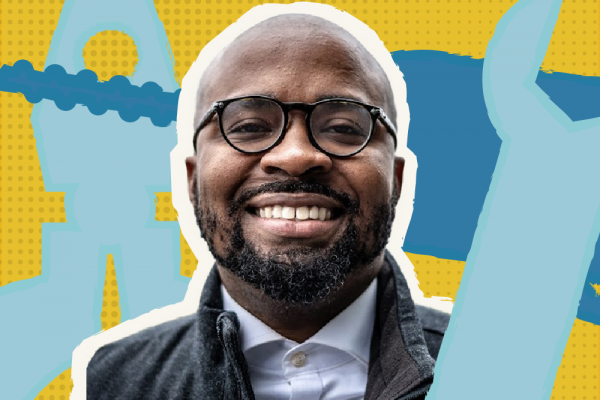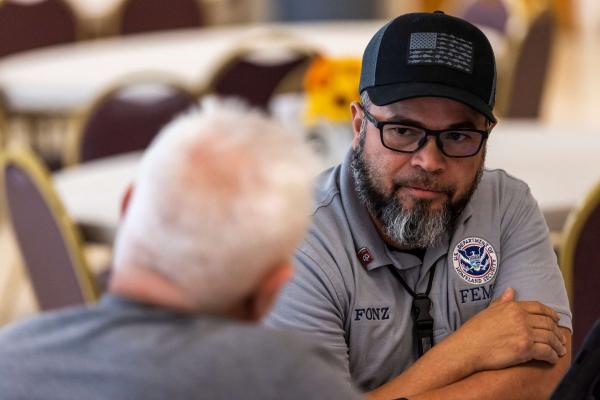In a televised interview this week with Sean Hannity of Fox News, former President Donald Trump initially refused to answer the question of whether, if elected in 2024, he would be a dictator or use his power to seek retribution for his political opponents. After Hannity pressed further, Trump said he would only be a dictator on “day one” of a new presidency; he did not rule out political retribution. This should be shocking, but are any of us surprised? Trump is known for his lying and exaggeration. Nevertheless, we make a grave mistake if we don’t take Trump’s words seriously.
Just last month, Trump promised to “root out the communists, Marxists, fascists, and the radical Left thugs that live like vermin within the confines of our country” and condemned his political opponents as “the threat from within,” which he claimed poses a greater threat than Russia, China, or North Korea. Before that, Trump — who is favored by polls to win the 2024 Republican nomination for presidency — has vowed that if he’s elected, he will use the Justice Department to seek retaliation against his political opponents, greatly expand presidential power, and further militarize the border with creation of detention camps for migrants.
It is time to declare that Trump’s rhetoric and campaign proposals are increasingly authoritarian and fascist; since so many Christians, particularly those who subscribe to tenets of Christian nationalism, remain his most loyal supporters, we Christians who disagree must be that much more vocal and courageous. Trump and his enablers are increasingly making the 2024 election a referendum on democracy itself, a fundamental issue that must transcend partisanship and even politics itself.
Those two words — authoritarian and fascist — are not terms I use lightly, and I think they’re important words for Christians to better understand as we approach the 2024 election. Since these words are often misused, I want to be clear what I mean: According to The Authoritarian Playbook, a resource for journalists produced by the nonpartisan anti-authoritarian group Protect Democracy, the seven tactics aspiring modern authoritarians employ include attempts to politicize independent institutions, spread disinformation, aggrandize executive power at the expense of checks and balances, quash criticism and dissent, marginalize vulnerable communities, work to corrupt elections, and stoke violence.
While authoritarian governments that meet these criteria have existed across the ideological spectrum, fascist governments are a specific type of far-right authoritarianism. The Council on Foreign Relations explains fascism as “a mass political movement that emphasizes extreme nationalism, militarism, and the supremacy of both the nation and the single, powerful leader over the individual citizen.”
When I read these definitions, it’s not hard to think of concrete ways that Trump has embodied each of them. Most notably, he pursued a multi-pronged plot seeking to overturn the outcome of the 2020 election and spread baseless lies that the election was stolen, ultimately inciting a crowd of his supporters to violently attack the United States Capitol to stop Joe Biden from being certified as the winner of the 2020 election. Though his efforts ultimately did not succeed, he has undermined bipartisan confidence in free and fair elections; while 71 percent of Democrats have “high confidence” the 2024 election will be counted fairly, just 22 percent of Republicans say the same, according to recent polling.
Throughout his presidency, Trump specifically targeted vulnerable or marginalized communities through efforts such as his Muslim ban, family separation policy, and constant dehumanizing rhetoric toward migrants. He further flouted democratic norms by refusing to uphold government ethics about conflicts of interest or to cooperate with oversight functions , including mandated reports and subpoenas for testimony. In documenting these and other democratic erosions under Trump, Freedom House, a nonpartisan organization that monitors the state of democracy and human rights around the world, noted that “the weakening of American democracy did not start with President Trump’s direct pressure on democratic institutions and rights, and his departure from the White House has not ended the crisis. Disturbing problems that predated his administration—legislative dysfunction, partisan gerrymandering, the excessive influence of special interests in politics, ongoing racial discrimination, and the spread of polarization and disinformation in the media environment—remain unaddressed.”
As we enter the 2024 election season with the increasingly anti-democratic and authoritarian tilt in the GOP, Christians must be clear about the threat authoritarianism and fascism pose to our future and our faith.
1. Authoritarianism concentrates power in the hands of a few; God calls us to seek the common good, with special attention to those with the least power and resources.
Throughout much of the Bible — think pharaohs, King Nebuchadnezzar, or Caesar — ancient leaders were dictators with nearly absolute power. Yet despite these examples (and some notable ways Christians have misused the Bible to endorse authoritarianism), there’s plenty in the Bible that challenges absolute power: As Ron Sider once put it, the Bible is full of stories of “oppressive kings and over-powerful, evil governments (for example, 1 Kings 2; Revelation 13) and warnings about what powerful rulers will do (1 Samuel 8:11-17),” contrasted with God’s command that leaders use their power to promote justice.
When I think about the Bible, I think about how the message of scripture attests to the inherent dignity and equal value of every human being, as we are all created in God’s very image. And when I think about which system of government are best able to fulfill that promise and God’s reign of righteousness, justice, and steadfast love, I think of democracy. While far from perfect, our constitutional, representative democracy guarantees basic protections and freedoms (such as freedom of religion, speech, and assembly; equal justice under the law; etc.) and enables us to create change and better hold our leaders accountable through affording every citizen the freedom to vote in elections — a freedom that is sadly under assault in many states across the country.
Authoritarianism and fascism are antithetical to biblical principles because these systems so readily allow one person’s whims to control the lives of the people they govern; there are limited ways to intervene if authoritarian leaders remove checks and balances, politicize independent institutions such as the Justice Department, and quash dissent through violence or the abuse of the law. Authoritarians seek to concentrate power and undermine the rule of law when the biblical prophets call for justice (mishpat) and righteousness (tsedeq), using power to protect human dignity and advance economic justice and the common good. These leaders so often dehumanize the other and seek to punish their enemies, while Jesus calls on us to love both our enemies and the other. They so often seek to undermine the truth through constant disinformation, but Jesus says that we should seek the truth.
2. Authoritarianism undermines all the other justice issues we care about; God calls us to recognize mutual interdependence.
Another challenge, often most acutely felt by Black and brown Americans, is that our democracy has long been deeply flawed, never fully living up to the full creedal promise of “liberty and justice for all.” For many others, democracy feels captured by elites and severely broken. As a result, the temptation for many of these folks is to tune out or disengage. Yet allowing authoritarianism to tighten its grip will mean the rolling back of racial justice, women’s rights, religious freedom, combating climate change, and so much more. As Christians, our very civic engagement — starting but not ending with voting — represents a critical expression of discipleship. Since our nation’s inception, we have been engaged in a long struggle to expand who “we the people” fully includes and to embrace a more inclusive and just multiracial democracy, a journey that will be fundamentally derailed and reversed if we allow the continued erosion of our democratic norms and systems.
3. Authoritarian leaders benefit from and assume power when dissenters stay silent; God calls people of faith to speak up and stand in the way.
As political scientists Steven Levitsky and Daniel Ziblatt have argued in their co-authored books, Why Democracies Fail and The Tyranny of the Minority, most contemporary democracies don’t fail because of a violent takeover or a military coup. Instead, they are lost by the gradual erosion of democratic norms and the abuse and manipulation of democratic laws and systems. Protect Democracy echoes this danger: “Today, democracy more often dies gradually, as the institutional, legal, and political constraints on authoritarian leaders are chipped away, one by one. This has happened — or is happening — in, among others, Russia, Venezuela, Hungary, the Philippines, Poland, Nicaragua, India, Turkey — and the United States.”
In his sermon “A Knock at Midnight,” Rev. Martin Luther King Jr. said that “the church must be reminded that it is not the master or the servant of the state, but rather the conscience of the state.” The church desperately needs to be that conscience right now, which means having the courage to speak clearly and forcefully against Trump’s increasingly alarming authoritarian rhetoric and plans.
I know part of the challenge is that boldly denouncing Trump’s rhetoric risks dividing our already polarized congregations and communities. And those risks are real: Some people, including fellow Christians, will interpret any critique of Trump’s authoritarian agenda as purely partisan.
Yet consider the alternative: If we remain silent or tepid in denouncing authoritarian rhetoric and policies, we cede our moral authority and fall directly into the trap that Trump and his enablers have set. Authoritarian leaders need accomplices and allies, including those who actively support them and those who are simply tolerant and complicit. While we must challenge Christians who have made a Faustian bargain with Trump or believe that the only way they can obtain and hold onto power is through a strongman or authoritarian leader, it is even more critical that we persuade and compel the far greater number of silent accomplices to break their silence, which includes many Republican elected officials and faith leaders across the country.
Though we will encounter opposition, we need to be resilient and relentless in proclaiming that being pro-democracy is not being partisan.
As we move into an increasingly tumultuous election year, we will need to see more courage from faith leaders in denouncing anti-democratic politics and appeals to authoritarianism as being beyond the pale and out of bounds, as a matter of conscience and faith. We can’t let standing up for democracy become further metastasized into a partisan issue. Instead, standing against authoritarianism and fascism has become a moral and theological imperative.
Got something to say about what you're reading? We value your feedback!







